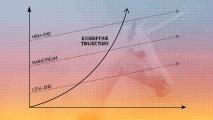Technology that merges the virtual and physical worlds could start to become a reality for consumers in a few years, Facebook owner, Meta Platforms Inc., has told advertising agencies, giving more details of its vision for the creation of the metaverse.
Meta tells advertisers mixed reality could be a few years away
Mixed reality (MR) technology could allow a person wearing an MR headset to use a real-world object to trigger a virtual-world reaction, like hitting a video game character with a real-world baseball bat, for instance.
It is one of three types of extended reality technologies often associated with the metaverse. Augmented reality exists, with mobile games like Pokemon Go, but players cannot affect the digital world with a physical object. Virtual reality headsets, like Meta’s Oculus, immerse users into a fully virtual world where they can interact with the environment.
The comments from Meta came on a Zoom call with ad agencies, which was scheduled to help advertisers better understand the metaverse, said an agency executive who attended the call. It was Meta’s first roundtable discussion with agencies about the metaverse.
The estimate of mixed reality being a few years away brings additional detail to the timeline of building the metaverse, the futuristic idea of a network of virtual worlds that can be accessed from different devices, which Meta has said could take a decade to build.
Three ways the metaverse could change the future of work
The pandemic has shown us all just how rapidly technology can change the way we work. As COVID-19 swept around the world, hundreds of millions of employees retreated from their offices and into the new world of work-from-home. As work meetings migrated to Zoom we learned how to curate our backgrounds and disguise the fact we hadn’t had a haircut during seemingly endless lockdowns.
The metaverse is likely to take the concept of virtual working to a whole new level. This article from Quartz at Work suggests the metaverse will function as a virtual office space, a place for virtual training and as an employee hang-out. In the metaverse, the virtual workspace will be provided by the employer so there’ll be less worry about what the books on the shelf in the background say about you as a professional. As for the messy hair, well your avatar can be crafted to project you as the person you most want to be, whatever real-world realities it disguises.
Big brands are staking their claim in the metaverse
Some of the world’s biggest companies – think Meta and Microsoft – are leading the race to create the virtual environments that will populate the metaverse. But as they set about laying the foundations of the virtual world to come, other major brands are positioning themselves to take advantage of the new economy that the metaverse may usher in.
The Guardian reports that “McDonald’s recently filed 10 trademark applications including one for a virtual restaurant” and also that Walmart, Samsung and PricewaterhouseCoopers are moving ahead with plans to operate in the metaverse.
Bloomberg recently predicted the metaverse economy could represent an $800 billion opportunity in 2024.
Manchester City and Sony are building a virtual stadium for fans in the metaverse
Soccer fans around the world may soon be able to experience the thrill of the English Premier League in the metaverse.
League champions Manchester City have partnered with Sony to develop digital fan experiences. Their announcement said, “the aim of this collaboration is to create a global online fan community where fans can interact with the club and each other within an online ‘metaverse’ which will be a virtual recreation of the Etihad Stadium.”
Republished with permission of the World Economic Forum under a Creative Commons license. Read the original article.






